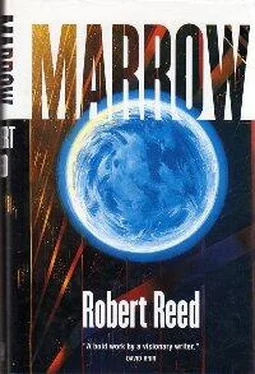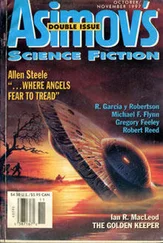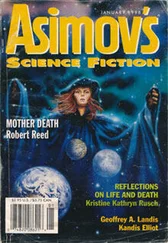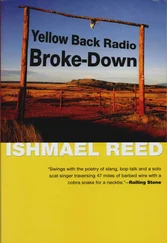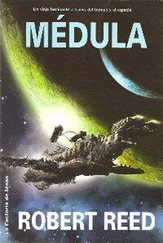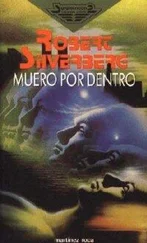Robert Reed - Marrow
Здесь есть возможность читать онлайн «Robert Reed - Marrow» весь текст электронной книги совершенно бесплатно (целиком полную версию без сокращений). В некоторых случаях можно слушать аудио, скачать через торрент в формате fb2 и присутствует краткое содержание. Год выпуска: 2000, ISBN: 2000, Издательство: Tor Books, Жанр: Фантастика и фэнтези, на английском языке. Описание произведения, (предисловие) а так же отзывы посетителей доступны на портале библиотеки ЛибКат.
- Название:Marrow
- Автор:
- Издательство:Tor Books
- Жанр:
- Год:2000
- ISBN:0-312-86801-4
- Рейтинг книги:5 / 5. Голосов: 1
-
Избранное:Добавить в избранное
- Отзывы:
-
Ваша оценка:
- 100
- 1
- 2
- 3
- 4
- 5
Marrow: краткое содержание, описание и аннотация
Предлагаем к чтению аннотацию, описание, краткое содержание или предисловие (зависит от того, что написал сам автор книги «Marrow»). Если вы не нашли необходимую информацию о книге — напишите в комментариях, мы постараемся отыскать её.
Marrow — читать онлайн бесплатно полную книгу (весь текст) целиком
Ниже представлен текст книги, разбитый по страницам. Система сохранения места последней прочитанной страницы, позволяет с удобством читать онлайн бесплатно книгу «Marrow», без необходимости каждый раз заново искать на чём Вы остановились. Поставьте закладку, и сможете в любой момент перейти на страницу, на которой закончили чтение.
Интервал:
Закладка:
Robert Reed
Marrow
To the first artist in my life, My grandfather, Quentin ‘Heinz’ Moore
THE SHIP
…a sleep, sweet as Death… time traversed, and an incalculable distance… and then a splash of light emerged from the dark and the cold, its warming touch slowly explaining itself to me, showing suns and little worlds and great swirls of colored gas and angry, roaring dust.
A barred spiral galaxy, this was.
Possessing such beauty, and a majesty, that I could not help but stare. And wrapped within that majesty, a frailty, ignorant and vast.
The galaxy’s path and mine were plain. Without question, we would collide.
My gaze was sure to be returned by many more gazes. I knew that, just as I had known that this day was inevitable. Yet when I saw that tiny first machine racing toward me, I was surprised. So soon! And yes, the machine could see me. I watched its mirrored eyes focus on my scarred old face. I watched it fire tiny rockets, exhausting itself in order to pass nearer to me. Then it spat out a minuscule device whose only duty was to collide with my face, undoubtedly followed by a trail of data and new questions. At nearly half the speed of light, we met. Only I survived. Then the mother machine swept past, turning its eyes, watching my trailing face, a part of me imagining its wondrous surprise.
My backside is adorned with rocket nozzles.
Bigger than worlds, and more ancient, my engines are as chilled and quiet as this ancient universe of ours.
Hello, I said.
Without a voice.
Brother machine, hello.
My friend continued on its way, and for a little while, I was alone again. Winch was when I first sensed just how deep my loneliness had grown.
Ignoring caution, denying every duty, I began wishing for another visitor. What would be the harm? A little robotic companion, transitory and incompetent… how could a mere device present any hazard to me…?
But it wasn’t one probe sent to greet me. No, the machines came in flocks and fleets. Some serenely committed suicide, diving into my leading face. Others flew near enough to feel my tug, curling around my backside, enjoying a close quick took at my great engines. Their shape and basic design were the same as the first probe, implying a shared maker. Following their trajectories back through space and time, I discovered a tell-tale intersection. A single yellowish sun lay at the nexus. It and its neighboring suns had spawned the machines. I slowly accepted the unlikely answer that a single species had seen me before any other. But clearly, this galaxy was not a simple place. As time passed and the intervening distances shrank, other devices arrived from a multitude of places. I watched a parade of machines built of simple metals and sculpted gas and encased in hydrogen ice, and from hundreds of thousands of suns came every sort of electromagnetic noise, in soft squirts and squawks, elaborate songs and brazen shouts.
“Hello,” the voices shouted. “And who are you, friend?” Who I appear to be, I am. “And what, friend, do you mean to us?” Just what I appear to mean, I told them. With silence. In every way, what you sec in me is most definitely what I am.
Animals came from someplace between me and that yellowish sun.
Their first vessel was tiny, and simple, and extraordinarily frail. Enormous bravery must have taken them this far. “Die creatures had to leave the brightness of their own galaxy, and at mid-voyage, they stopped themselves, turned and started home again, their little engines pushing and pushing, matching my terrific velocity at the perfect moment. Then they slowed again, just slightly, letting me catch up to them, and maintaining a smart cautious distance, they coaxed themselves into a useful orbit.
As I watched, a thousand automated machines descended on me.
Hovered, then set down.
My scars and my trajectory implied my age.
No galaxies lay behind me. Not even a dark, half-born galaxy of consequence. Tliat kind of emptiness has few obstacles. Comets are rare, suns rarer, and even simple dusts are scarce. Yet my leading face was cratered and cracked, implying to the curious animals that I had come a terrific way, and I was as old as their home world.
At the very least.
“This ship is cold,” their machines reported. “Most definitely asleep, and quite possibly dead.” A derelict, in simple terms.
Between my leading face and the trailing face lay great ports, empty and closed, and securely locked. But smaller hatches and doorways could be opened with a determined push, and after begging for instructions, that was what several machines did. They eased open doors that had been closed almost forever, and behind them they found descending passageways and neat, unworn stairs perfectly suited for a humanoid’s graceful, long-legged gait.
The animals themselves made their last little leap.
When feet had last descended my stairs, I could not recall. But here came the humans, in twos and tens, entering my interior with a cautious sense of purpose. At first, they wore bulky suits and carried weapons and spoke in soft radio voices, using elaborate codes. But as they moved deeper, the old air thickened around them, and tests showed oxygen left to breathe, a multitude of life-support systems still at work, coaxing my guests to remove their helmets, sniffing once, then breathing deeper, and in that human fashion, smiling.
The first voice said, “Hello,” and heard only its own nervous echo in reply.
Beneath my armored hull was a vast cold ocean of stone laced with grand passageways and abrupt dead ends and rooms too vast to be absorbed in a single look, or even a lifetime. The darkness was thorough, relentless. But every wall and ceiling had its lamps and holoprojectors, their machinery transparently simple and easily ignited; plus there were armies of local reactors waiting to be brought from their slumber modes to furnish power.
In little places, then larger ones, I was awakened.
And still, I had no voice.
Did I ever possess the power of speech?
Perhaps not, I realized. Perhaps what I remember as my voice is actually another’s. But whose? And how can any span of time rob such a basic, essential knowledge?
Most of the humans now boarded me.
With care and fondness, I counted them. Twelve to the fourth power, plus a few more. Which was a tiny, almost negligible number compared to my vastness.
But then more ships arrived—an armada coming from other suns, other human worlds. These newer vessels had more powerful, efficient engines. And I realized that even if these were animals, they could adapt quickly. Which had to be a good thing.
But why was it good?
With all of my new energies, I tried to shout at my innocent companions, begging them to please listen to me. Yet I was mute.
Save a whispering wind, and the crackle if random energy in a granitic wall, and the dry clatter of gravel preceding the touch of a human foot, I could make no sound.
The human population increased another twelvefold.
And for a little while after that, nothing changed.
The explorers had all arrived. With a crisp efficiency, they mapped every tunnel and crevice, giving each a precise designation.
Every large room and cavernous chamber was honored with a special name. Great seas of water and ammonia, methane and silicone, were found in my interior, at many depths. Banks of machinery could manipulate their chemistry, making them suitable for a wide range of life-forms. Understandably, the humans adjusted one of the water seas as an experiment, its salts and acidity made to their liking, its temperature warm on the surface and cold beneath; and with a bid toward permanence, they built a little city overlooking the sea’s black-bouldered shore.
Читать дальшеИнтервал:
Закладка:
Похожие книги на «Marrow»
Представляем Вашему вниманию похожие книги на «Marrow» списком для выбора. Мы отобрали схожую по названию и смыслу литературу в надежде предоставить читателям больше вариантов отыскать новые, интересные, ещё непрочитанные произведения.
Обсуждение, отзывы о книге «Marrow» и просто собственные мнения читателей. Оставьте ваши комментарии, напишите, что Вы думаете о произведении, его смысле или главных героях. Укажите что конкретно понравилось, а что нет, и почему Вы так считаете.
